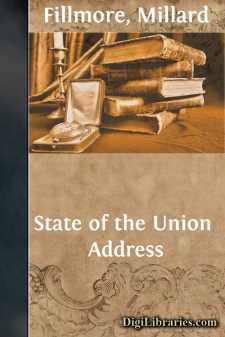Political Science
- Conspiracy & Scandal Investigations 1
- Constitutions 7
- Economic Conditions 10
- General 46
- Government 6
- History & Theory
- Peace 1
History & Theory Books
Sort by:
Mr. President: It is now three years since the resolve was adopted by the Senate, which it is my present motion to expunge from the journal. At the moment that this resolve was adopted, I gave notice of my intention to move to expunge it; and then expressed my confident belief that the motion would eventually prevail. That expression of confidence was not an ebullition of vanity, or a presumptuous...
more...
Mr. President, Mr. Speaker, Members of the Eighty-third Congress: I welcome the honor of appearing before you to deliver my first message to the Congress. It is manifestly the joint purpose of the congressional leadership and of this administration to justify the summons to governmental responsibility issued last November by the American people. The grand labors of this leadership will involve:...
more...
by:
Jimmy Carter
Two years ago today we had the first caucus in Iowa, and one year agotomorrow, I walked from here to the White House to take up the duties ofPresident of the United States. I didn't know it then when I walked, butI've been trying to save energy ever since. I return tonight to fulfill one of those duties of the Constitution: to give to the Congress, and to the Nation, information on the state...
more...
Mr. Speaker, Mr. President, members of the 103rd Congress, my fellowAmericans: I am not sure what speech is in the TelePrompTer tonight, but I hope we can talk about the State of the Union. I ask you to begin by recalling the memory of the giant who presided over this chamber with such force and grace. Tip O'Neill liked to call himself "A Man of the House" and he surely was that. But even...
more...
by:
John Tyler
To the Senate and House of Representatives of the United States: In coming together, fellow-citizens, to enter again upon the discharge of the duties with which the people have charged us severally, we find great occasion to rejoice in the general prosperity of the country. We are in the enjoyment of all the blessings of civil and religious liberty, with unexampled means of education, knowledge, and...
more...
by:
Zachary Taylor
Fellow-Citizens of the Senate and House of Representatives: Sixty years have elapsed since the establishment of this Government, and the Congress of the United States again assembles to legislate for an empire of freemen. The predictions of evil prophets, who formerly pretended to foretell the downfall of our institutions, are now remembered only to be derided, and the United States of America at this...
more...
by:
Millard Fillmore
Fellow-Citizens of the Senate and of the House of Representatives: Being suddenly called in the midst of the last session of Congress by a painful dispensation of Divine Providence to the responsible station which I now hold, I contented myself with such communications to the Legislature as the exigency of the moment seemed to require. The country was shrouded in mourning for the loss of its venerable...
more...
by:
John Evelyn
INTRODUCTION On October 24, 1659, a quarto pamphlet was published in London with the following title: “The Army’s Plea for Their present Practice: tendered to the consideration of all ingenuous and impartial men. Printed and published by special command. London, Printed by Henry Hills, Printer to the Army, dwelling in Aldersgate Street next door to the Peacock. 1659”. Three days afterwards, on...
more...
by:
Abraham Lincoln
Fellow-Citizens of the Senate and House of Representatives: In the midst of unprecedented political troubles we have cause of great gratitude to God for unusual good health and most abundant harvests. You will not be surprised to learn that in the peculiar exigencies of the times our intercourse with foreign nations has been attended with profound solicitude, chiefly turning upon our own domestic...
more...
AMERICAN HOME RULE BY E.L. GODKIN American experience has been frequently cited, in the course of the controversy now raging in England over the Irish question, both by way of warning and of example. For instance, I have found in the Times as well as in other journals—the Spectator, I think, among the number—very contemptuous dismissals of the plan of offering Ireland a government like that of an...
more...











